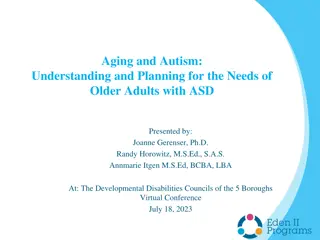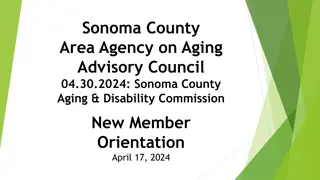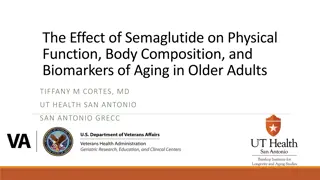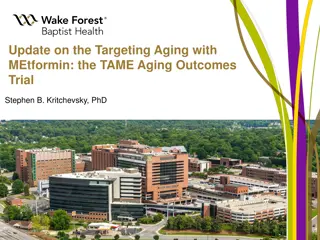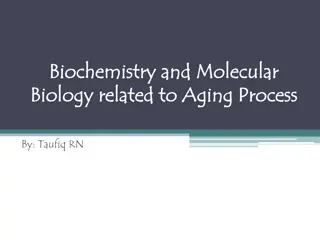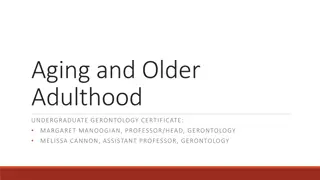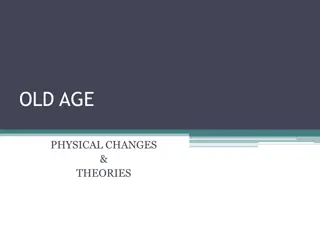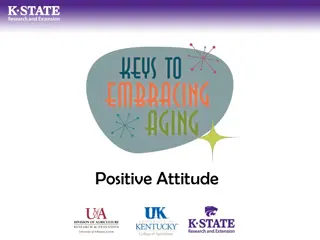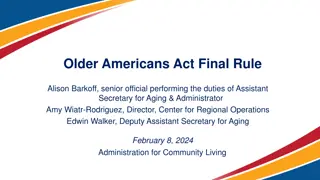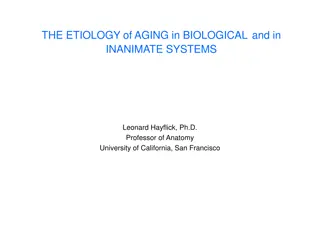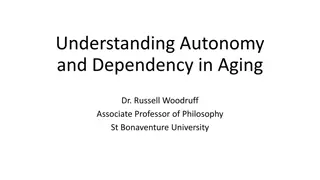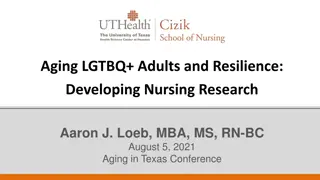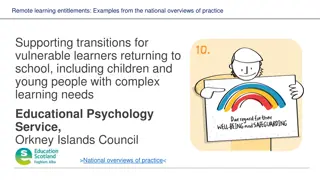Later Life Transitions: Embracing Opportunities in Aging Society
Later Life Transitions explore the shifting demographics and societal challenges as people live longer. Active aging, health optimization, and embracing aging as a privilege are key themes. Challenges in physical, mental health, and social capital are addressed, reflecting on the evolving landscape of retirement and well-being in later life.
Download Presentation

Please find below an Image/Link to download the presentation.
The content on the website is provided AS IS for your information and personal use only. It may not be sold, licensed, or shared on other websites without obtaining consent from the author. Download presentation by click this link. If you encounter any issues during the download, it is possible that the publisher has removed the file from their server.
E N D
Presentation Transcript
Later Life Transitions Ken Laidlaw, PhD Consultant Clinical Psychologist/Senior Lecturer
Later Life Transitions Health is a state of complete physical, mental and social well-being and not merely the absence of disease or infirmity. (WHO, 1948) Increasing longevity across societies in the developed and developing world is a major societal achievement, and a challenge (WHO, 2001).
Later Life Transitions Active ageing is the process of optimizing opportunities for health participation and security in order to enhance quality of life as people age. The new paradigm suggested by active ageing is that older people are active participants in an age- integrated society and are valued and active contributors to society, not just recipients. It is Rights Based rather than Needs Based.
Later Life Transitions Profound, Global and Irreversible demographic shift (UN, 2007) People are living longer and healthier Ageing is about how we become our own person Ageing is not a defeat but a victory; not a punishment but a privilege. Ethel Percy-Andrus
Later Life Transitions By 2050, 1 in 3 residents will be aged 65 years and older in Austria, Greece, Italy, Japan, Slovenia and Spain (UN, 2002). When considering the proportion of people aged 60 years + all of the world s top 30 oldest countries are European, with the exception of Japan (1st oldest)
Later Life Transitions Between 2000-2050 life expectancy at age 80 is expected to increase by 27% Life expectancy in 1931 for men was 58 years and for women it was 62 years. Using 2006 stats, a man aged 65 years could expect to live for another 17 years and a woman aged 65 years could expect to live for another 20 years.
Later Life Transitions There can be many transitions to be achieved in later life Retirement & Adjustment Challenges to Physical Health Status Challenges to Social Capital Challenges to Mental Health and Wellbeing Attitudes may be important
Later Life Transitions Successful transition from one state to another is probably important for determining a person s mental health, well-being and quality of life. Often problems develop when people try to use outmoded strategies when circumstances have changed. Thus people get stuck. This sort of difficulty in negotiating a transition can often be the reason a person seeks help
Later Life Transitions: Retirement Retirement has been called one of the most important late life transition (van Solinge & Henkens, 2007). Evidence for the impact of retirement on health and wellbeing is mixed (Kim & Moen, 2002). Retirement is now becoming more individualised and less governed by statutory factors (Vickerstaff, 2006) How a person manages retirement may depend upon the choice they exercised in the decision. Choice may be determined by income, gender, health and organisation Health may be a retrospective reason
Later Life Transitions: Retirement Retirement is more likely a process than a state. There are gender differences in retirement. Men s morale appears to improve as move into retirement Pre-existing vulnerabilities important in relationship between depression & retirement Sense of personal control is important for both genders Women tend to have the greater difficulty adjusting to retirement Health is relatively small in terms of impact on adjustment. Retirement is a couple phenomenon Interdependence: People may retire because their spouse is ill. Premorbid nature of relationship is important Context and Psychological factors important for successful transition (van Solinge & Henkens, 2005).
Later Life Transitions: Physical Health Loss and change is a universal experience (Boerner & Jopp, 2007). While people are living longer they are living healthier (WHO, 2002) with a restriction of disability to the final years of life (Baltes & Smith, 2002). As well as objective losses in later life there may be unwelcome symbolic changes that suggest transitions may take place over a very long period of time. Chronic illness is common in later life with 50% of people over age 65 experiencing at least one illness.
Later Life Transitions: Social Capital Our social embeddedness becomes more, not less, important as we grow older. From the cradle to the grave we all need others (Takahashi, 2005). There is a long and complicated association between social relations and health and well- being (Antonucci et al, 2002). Social relations may mean many things, such as network or support. It may be that quality of support may be more important than quantity of support. The subjective perception of support may also be an important factor.
Later Life Transitions: Social Capital Older people will have multiple close relationships with others in order to maximise well-being. There will be different roles and functions to each of the relationships. Convoy Model (Antonucci, 1986) suggests that individuals are distinguished by how important they are to the person. Healthy adults normally nominate 10 people in their social networks (Takahashi, 2005). Usually there is an inner circle of 3 or 4 people who provide most critical supports (confidant, reassurance, sickness care, talk when sick). The outer circle mainly provides respect.
Later Life Transitions: Social Capital Differences in social networks are evident as people age. As different responsibilities may be evident at different ages. There are gender differences in social networks (Ajrouch et al, 2005). Women have larger more diverse social networks with more people considered close. Men may experience greater continuity in social networks as they age With age, women experience reductions in network availability and resources. Carstensen & Colleagues have developed Socio-emotional Selectivity Theory. Older people motivated by limited time horizons to selectively focus on intimate social relations. Well- being is linked to maintaining intimate social ties.
Later Life Transitions: Mental Health Mental Health and Well- Being One of the biggest challenges to well-being is depression. Depression is not an outcome of old age Depression is an illness that can and should be treated
Later Life Transitions: Mental Health Schaie (2008) notes that it is a common assumption that universal cognitive decline is an outcome of age. In reality, a few unfortunately experience decline and dementia, but many do not, and a lucky few may even go on to achieve selective gains in later life. When people are depressed the expectation that ageing will be distressing leads people to accept inadequate treatment.
Late Life Transitions: Attitudes to Ageing Attitudes may be crucial in how we manage late life transitions. Levy (2002) talks of an internalized negative age stereotype: When individuals reach old age, the ageing stereotypes internalized in childhood, and then reinforced for decades, become self-stereotypes. But there is also the paradox of ageing that seems to contradict this idea. When people become depressed these attitudes change and people become more negative.
Late Life Transitions: Attitudes to Ageing Attitudes to Ageing questionnaire (Laidlaw et al, 2007) developed in 15-20 countries worldwide. Provided a new way of measuring attitudes to ageing both in terms of personal and general attitudes Three different scores possible Psychosocial Loss Physical change Psychological growth
Late Life Transitions: Attitudes to Ageing The majority of participants (71.5%) rated their health as good and 18.2% reported that they were dissatisfied or very dissatisfied with their health. 69.8% of people rated the quality of life as good or very good with 89.5% of people stating that they were satisfied or very satisfied with their health. Young-Old Old-Old Healthy 73% 68.1% Unhealthy 27% 31.9% There were no significant differences in health or life satisfaction between young- old and old-old participants Young-Old Old-Old Satisfaction with Life Dissatisfied Neither 0.9% 2.2% V. Dissat 0.0% 2.2% Satisfied 64.7% 65.7% V. Satisfied 24.8% 24.8% 9.6% 5.1%
Late Life Transitions: Attitudes to Ageing Very Preliminary Exploration at level of items Gender (2227 men & 3160 women) Using P <.001 Old age is a time of Loneliness - w (ES = .32) Capacities and abilities decline with age - m (ES = .08) Old age mainly a time of loss - w (ES = .09) Personal beliefs mean more as I grow older - w (ES = 0.21) ?SST Unhappy with changes in my appearance - w (ES = .30) GDS 1 (>4400 said yes)Depression has big impact on AAQ scores. On all items except personal beliefs p < .0005 differences Subjective health status has same impact on all items except wisdom p < .0005 differences
Late Life Transitions: Attitudes to Ageing Chachamovich et al., (2008) reports that consistent with the WHOQOL-Old, the AAQ scores are progressively influenced by increasing levels of GDS depression scores. This phenomenon occurs not just with depressed but also the subsyndromal subsample. Classifying someone as depressed/not depressed may fail to capture significant challenges to the experience of ageing and QoL.
Late Life Transitions Is it too simple to say it is all in the mind? Maybe, chronological age is the least important factor in understanding how people manage late life transitions? "To be young is to be fresh, lively, eager, quick to learn; to be mature is to be done, complete, sedate, tired. What if we consider a different perspective? To be young is to be unripe, unfinished, raw, awkward, unskilled, inept; to be mature is to be ready, whole, adept, wise." Making the transition means valuing our years of experience and keeping our intellectual, and emotional growth going so that we can gain wisdom and not just years



